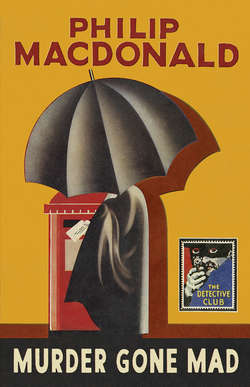Читать книгу Murder Gone Mad - Philip MacDonald - Страница 7
CHAPTER I I
ОглавлениеTHERE had been a fall of snow in the afternoon. A light, white mantle still covered the fields upon either side of the line. The gaunt hedges which crowned the walls of the cutting before Holmdale station were traceries of white and black.
The station-master came out on to the platform from his little overheated room. He shivered and blew upon his hands. The ringing click-clock of the ‘down’ signal arm dropping came hard to his ears on the cold air.
‘Harris!’ called the station-master. ‘Six-thirty’s coming!’
A porter came out from behind the bookstall. He was thrusting behind a large and crimson ear a recently pinched-out end of a cigarette.
The six-thirty came in with much hissing of steam and a whistling grind of brakes. The six-thirty reached the whole length of Holmdale’s long platform. The six-thirty looked like a row of gaily-lighted, densely-populated little houses. The six-thirty’s engine, for some reason known only to itself and its attendants, let off steam in a continuous and teeth-grating shriek. The doors of the six-thirty all along the six-thirty’s flank began to swing open. Holmdale was the six-thirty’s first stop since leaving St Pancras, now forty miles and forty-five minutes behind it.
The station-master stood by the foot of the steps leading up to the bridge. He opened a square and bearded mouth and chanted his nightly chant, quite unintelligibly, of what was going to happen to the train. He should properly have walked up and down the train with his chant, but he knew only too well that to walk at all against this tide which now covered the platform like a moving carpet of black, huge locusts, was impossible.
The six-thirty’s engine ceased its hissing. There was a great slamming of doors which sounded under the station’s iron roof like big guns heard in the distance. There were indistinguishable cries from one end of the train to the other. The guard held up his lantern, green-shaded. The six-thirty settled down to her work. The little lighted houses, most of them now untenanted, began once more their rolling march … The six-thirty was gone.
But, as yet, only the very first trickles of the black flood were over the bridge and outside Holmdale station. They were so tight packed, the units which went to the making of this flood, that speed, however passionately each unit undoubtedly desired it, was impossible. They surged up the stairs. At the head of the stairs they split into two streams, one flowing right and east and the other left and west. Two streams flowed across the bridge and down other stairs. At the foot of each staircase stood a harassed porter snatching such tickets as offered themselves and glancing, like a distracted nursemaid, at hundreds of green, square pieces of pasteboard marked ‘Season’.
The left-hand staircase leads into the main booking hall of Holmdale station and this hall is lighted. As the flood, after the first trickling, really surges into the hall, it is possible for the first time fully to realise that not only are the component parts of the flood human, but that these humans are not uniform. Look, and you will see that there are women where at first you would have been prepared to take oath that there had been nothing save men. Look again, and you will see that all the hats are not, as you first supposed, bowler hats and from the same mould, but that every here and there a rebellious head flaunts cap or soft hat. Look again, and you will see that the men and the women are of different height, different feature and perhaps, even, different habit. But you will look in vain for man or woman who does not carry a small, square, flat case.
The flood pours through the booking hall and out through the double doors into the clear, cold night. In the gravelled, white-fenced, semi-circular forecourt to the station, wait, softly chugging, two bright-lighted omnibuses looking like distorted caravans. Each of these omnibuses is meant to hold—as he who peers may read—twenty-seven passengers. Each, not less than two minutes after the flood has begun to break about their wheels, grinds off through the night with fifty at least. The rest of the flood, thinning gradually into trickles and then, at last, into units, goes off walking and talking. Their voices carry a little shrill on the cold, dark air and the sound of their boot-soles rings on the smooth iron road. Between the forecourt and the station is a dark expanse edged at its far sides by little squares of yellow light where the houses begin.
